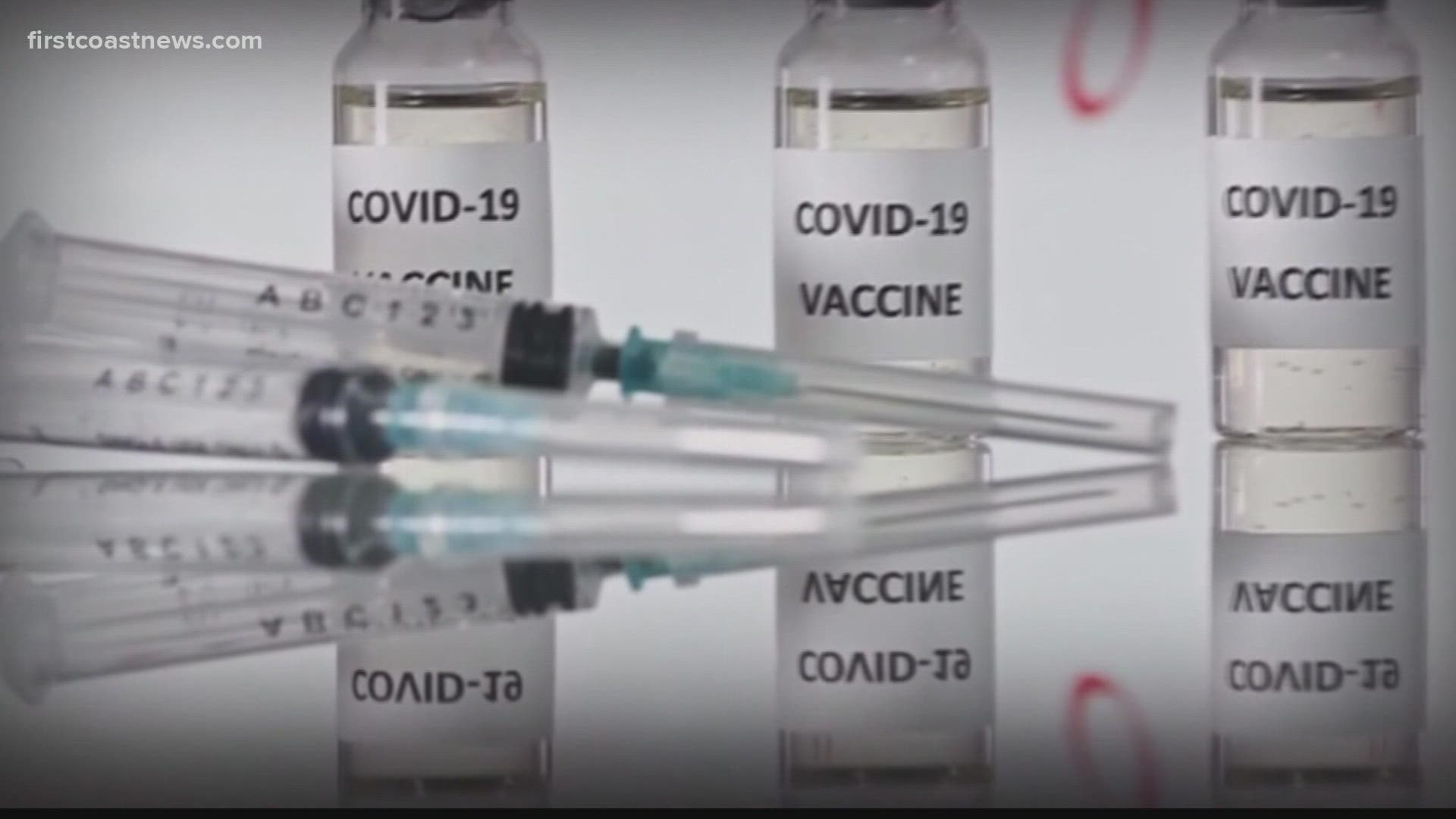JACKSONVILLE, Fla. — According to an internal report from the Centers for Disease Control and Prevention, breakthrough COVID cases, cases among those who are fully vaccinated, are rising.
According to Dr. Shalika Katugaha, System Medical Director of Infectious Diseases at Baptist Health, there are about 35,000 breakthrough cases of COVID per week in the United States.
“While that number on its own seems quite large, we have to put it in proportion to the 173 million individuals in the United States who have been vaccinated as of August 30," Katugaha said. "So, the estimate is around .02 percent of Americans are getting breakthrough cases."
She said that number may be an underestimate, though, because not everyone is reporting breakthrough cases.
"Breakthrough infections can mean you don't even have any symptoms at all," Katugaha explained. "It could just be that you went to get tested before a flight or before an event, and you just tested positive, and so those people wouldn't necessarily report it."
The CDC stopped publicly releasing the number of total breakthrough cases in May, choosing instead to focus on reporting breakthrough cases that resulted in hospitalizations or deaths.
According to data from the CDC from 49 states and territories, as of Aug. 30, 2021, 2,437 people died from breakthrough cases, and 10,471 were hospitalized. In 21 percent of the deaths, patients were asymptomatic or the death was not COVID-related, but the patient tested positive for COVID.
Some states still publicly report breakthrough cases, but Florida isn't one of them. First Coast News reached out to the Florida Department of Health about why that is and is waiting to hear back.
The CDC is currently conducting several vaccine effectiveness studies and monitoring breakthrough cases across the country. It's also working with health departments in states and towns to investigate clusters of breakthrough cases to determine patterns and trends in those cases like age and underlying conditions.
"The vaccines are intended to save lives, and that's why I'm so passionate about them," Katugaha said. "They are still doing that. They are preventing hospitalization, they are preventing death. They are preventing severe illness. They are actually cutting down rates of long COVID, which is symptoms of COVID for greater than a month, by 50 percent."
Katugaha said as variants, like delta, continue to spread, and more people get vaccinated, there's a higher chance someone who's vaccinated gets COVID. According to the CDC, low vaccination rates are driving the surge in cases and the chance of more variants.
"As more people get vaccinated, we're going to see more breakthroughs. That's just a function of what it is, more of us are vaccinated, some more of the cases will be breakthrough infections," Katugaha said.
Katugaha gave the analogy of when a high percentage of people start to wear seatbelts, a higher percentage of car accidents are going to involve people who wear seatbelts. However, the overall fatality rate for car accidents will drop.
"This is what viruses do, and this is not a surprise to any infectious disease expert," she explained. "They're [the virus] trying to outsmart our vaccines, and then they do a little bit, but then we come back with what are our measures are maybe, you know, it could be a booster. It could be new vaccines, which will actually come out. And so this is an expected thing, and we will see more of it, and it is actually because of variants," she said.
According to Katugaha, older and higher-risk adults are more likely to develop breakthrough infections. She said that age group is also more likely to be vaccinated.
Most people, more than 90 percent, at Baptist right now with COVID, she said, are unvaccinated.
"It is a pandemic of the unvaccinated," she said.
Katugaha said the vaccines' efficacy drops with variants, but it still protects us from COVID.
"The vaccines still work against delta and still work against most variants. It's just the efficacy drops a little bit, and that's why the United States, that's why public health officials right now are talking about this booster for everyone," she said.
Katugaha said companies are looking at modifying their vaccines to be more effective against fighting variants.
People who are fully vaccinated can still transmit the virus just like unvaccinated people, Katugaha said. However, the length of time vaccinated individuals shed the virus is much shorter, multiple studies found.
“Please, please don't let the idea that there are breakthrough infections make you hesitant to get the vaccine. We are seeing kind of what we're supposed to see out there, which is that there are more breakthrough infections in the setting of more vaccinated cases," she said.
Katugaha said because those who are vaccinated can still get COVID doesn't mean the vaccine isn't working.
“It actually means that vaccines are working because what vaccines were intended to do all vaccines is not to prevent infection, but to prevent disease, or severe illness, hospitalization and death, and actually, the COVID vaccines are doing that very, very well," she said.
According to Katugaha, if you're fully vaccinated and wondering what you can do safely, look at your own variables, like if you have any underlying health conditions.
“Look at what you want to do. How risky is the activity that you want to do and look at where you live and how likely is that you are to get the infection if you go in the community, especially in an indoor place," she said.
Katugaha also recommends taking precautions, vaccinated or not.
“While we can't live in fear, we certainly have to be very cautious. And now is still a time, sadly to be cautious. So, yes, to mask to wash your hands and to socially distance," she said.

